法语读音规则一览表最全)
法语读音规则总表
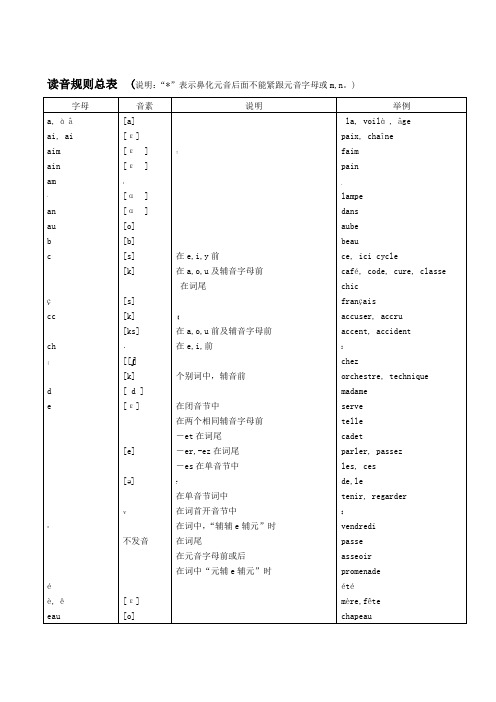
[waj]
[p]
[f]
[k]
[k]
[r]
[s]
[z]
[s]
"
[sk]
[t]
[y]
[ Ч ]
[ œ]
[ɔm]
[ œ]
[ɔ]
[v]
[v]
`
[w]
[ks]
[gz]
[s]
[z]
[i]
[j]
=i+i
[ ε
在元音前
在元音前
;
不在两个元音字母之间
在两个元音字母之间
在e i y前
在a,o,u及辅音字母前
ceux
creuser
neuf
faites
genre, gilet, gymnase
gare, gorge,légume
glace
~
signe
habiter
livre
ciel
crier
naïf, île
lien
pareil
gentil
travailler
)
millet
ville
impossible,simple
ill
im
in
>
j
k
l
m
n
o
ô
oeu
\
oi,oî
[ε]
[ ε]
[ α]
[am]
[ α]
[ø]
[œ]
《
[f]
[ З ]
[g]
[ ŋ ]
[i]
[j]
[ij]
[i]
。
[jε]
[j]
[i]
[j]
(完整版)法语读音基本规则表(从字母到音)
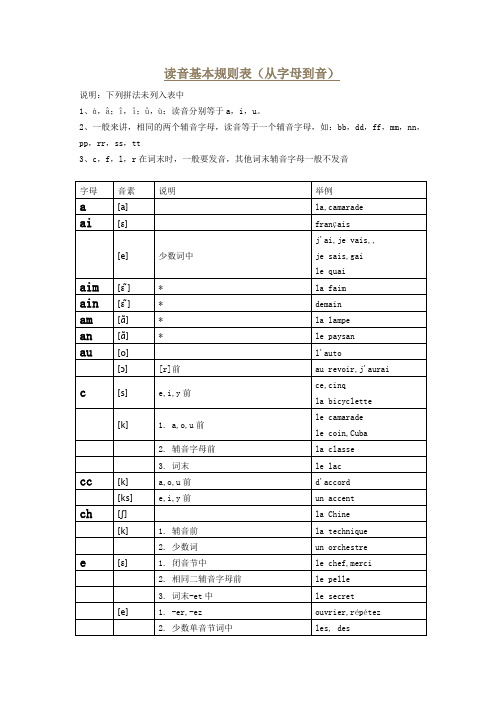
[ʒ]
e,i,y前
l'image,le gilet
la gymnastique
gn
[ɲ]
le peigne
gu
[g]
e,i,y前
la baguette,le guide
h
不发音
le cahier
i
[i]
la vie
[j]
元音前
l'étudiant
ien
[jɛ̃]
*
bien
-il
[j]
在词末,并在元音后
le travail,le soleil
ill
[j]
travaiiler
[ij]
辅音后
brilliant
im
[ɛ ̃]
*
le timbre
in
[ɛ̃]
*
cinq
o
[o]
1. 词末开音节中
l'auto,la radio
2. [z]前
la rose
[ɔ]
除以上二情况以外
le soldat
la technique
2. 少数词
un orchestre
e
[ɛ]
1. 闭音节中
le chef,merci
2. 相同二辅音字母前
le pelle
3. 词末-et中
le secret
[e]
1. -er,-ez
ouvrier,répétez
2. 少数单音节词中
les, des
[ə]
1. 单音节词末
le,de
=j
在二元音字母间,主要在专有名词中
La Fayette,
法语读音规则一览表最全
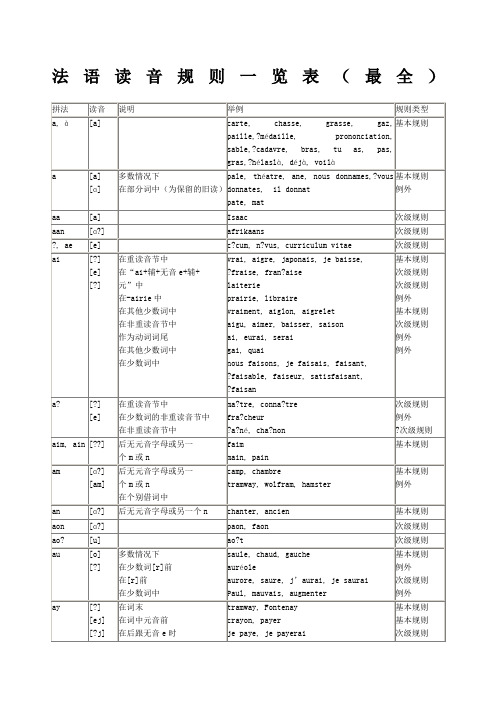
?agenda, mémento, pentagone,
?benzine, pensum, benjamin
Agen, Saint-Gaudens, Rubens,
?Stendhal
Eden, lichen, pollen, spécimen,
基本规则
基本规则
eu
[?] [?]
[y]
多数情况下
在词末开音节中
在[z][?][t][d]前
在eu-开头的词中
在其他少数词中
在avoir的变位形式中
heure, ils veulent, déjeuner
peu, deux, il peut, peut-être
creuser, précieuse, Maubeuge,
次级规则
例外
基本规则
次级规则
基本规则
é
[e]
[?]
多数情况下
在“é+辅+无音e+辅+
元”中
在其他个别词中
été
céleri, événement [ev?nmɑ?]
je crée
基本规则
次级规则
例外
è
[?]
mère, poète
基本规则
ê
[?]
[e]
在重读音节中
在“ê+辅+无音e+辅+
元”中
在个别词非重读音节
c?ur
sac, caduc, avec, lac, bec, Marc
ce, c?sium, civil, c?lacanthe,
?bicyclette
法语读音规则表
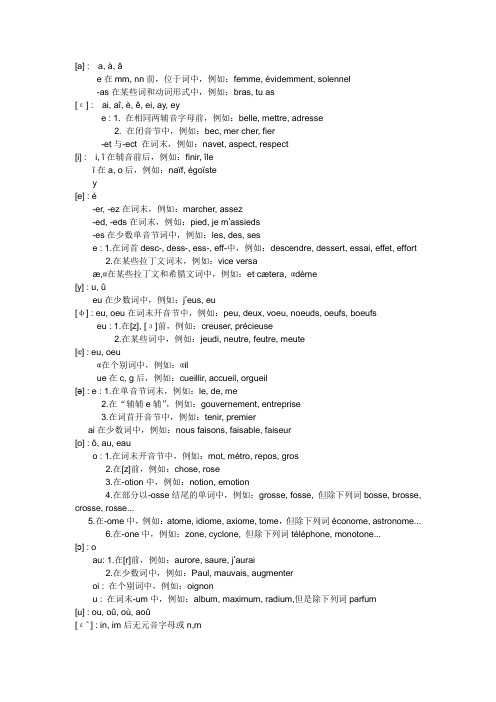
[a] : a, à, âe在mm, nn前,位于词中,例如:femme, évidemment, solennel-as在某些词和动词形式中,例如:bras, tu as[ε] : ai, aî, è, ê, ei, ay, eye : 1. 在相同两辅音字母前,例如:belle, mettre, adresse2. 在闭音节中,例如:bec, mer cher, fier-et与-ect 在词末,例如:navet, aspect, respect[i] : i, î在辅音前后,例如:finir, îleï在a, o后,例如:naïf, égoïstey[e] : é-er, -ez在词末,例如:marcher, assez-ed, -eds在词末,例如:pied, je m’assieds-es在少数单音节词中,例如:les, des, sese : 1.在词首desc-, dess-, ess-, eff-中,例如:descendre, dessert, essai, effet, effort2.在某些拉丁文词末,例如:vice versaæ,œ在某些拉丁文和希腊文词中,例如:et cætera, œdème[y] : u, ûeu在少数词中,例如:j’eus, eu[φ] : eu, oeu在词末开音节中,例如:peu, deux, voeu, noeuds, oeufs, boeufs eu : 1.在[z], [з]前,例如:creuser, précieuse2.在某些词中,例如:jeudi, neutre, feutre, meute[œ] : eu, oeuœ在个别词中,例如:œilue在c, g后,例如:cueillir, accueil, orgueil[ǝ] : e : 1.在单音节词末,例如:le, de, me2.在“辅辅e辅”,例如:gouvernement, entreprise3.在词首开音节中,例如:tenir, premierai在少数词中,例如:nous faisons, faisable, faiseur[o] : ô, au, eauo : 1.在词末开音节中,例如:mot, métro, repos, gros2.在[z]前,例如:chose, rose3.在-otion中,例如:notion, emotion4.在部分以-osse结尾的单词中,例如:grosse, fosse, 但除下列词bosse, brosse, crosse, rosse...5.在-ome中,例如:atome, idiome, axiome, tome,但除下列词économe, astronome...6.在-one中,例如:zone, cyclone, 但除下列词téléphone, monotone...[ɔ] : oau: 1.在[r]前,例如:aurore, saure, j’aurai2.在少数词中,例如:Paul, mauvais, augmenteroi : 在个别词中,例如:oignonu : 在词末-um中,例如:album, maximum, radium,但是除下列词parfum[u] : ou, oû, où, aoû[ε˜] : in, im后无元音字母或n,main, aim, ein, yn, ymen : 1.-ien,例如:bien, rien, Parisien2.在é后,例如:européen, méditerranéen3.在某些拉丁文和外国语借词中,例如:examen, mémento4.在某些专有名词中,例如:Agen, Saint-Gaudens[œ˜] : un, um, eun[ã] : enen后接元音字母或n, 但在词首,例如:enorgueillir, enivrer, ennui, enneiger,但除以下词外ennemi, henniremem后接m, 但在词首,例如:emmener, emmitoufleran, amaon在个别词中,例如:paon, faon[ɔ˜] : on, omun, um 在某些拉丁文借词中,例如:secundo, lumbago[j] : i, ï在元音前-il在元音后,位于词尾ill在元音后,如:bataillon, mouillery在词首,如:yeux[ij] : ill在辅音后,例如:fille, billet, 但在下列词中读[il] : mille, ville, village, tranquille, distiller, oscilleri在辅+L或r+i+元,例如:plier, crier[...j] : y=i+i 在两个元音中,如crayon, voyelle, essuyer, tuyau, fuyard[Ч] : u 在元音前,nuit, muet, nuage, juin[w] :ou在元音前,如oui, jouet, douanew,如tramway[wa] : oi, oy[w] : oin, 如point, moins[g] : g在a, o, u和辅音字母前gu在e, i, y前[gz] : x 在词首ex-, inex+元音中,例如:examen, exhiber,[k] : c,cc在a, o, u和辅音字母前-c在词末ch在r, n前,如:chrétien, technique, chroniquequ-q在个别词末,如:cinq, coqk[ks] : x, -xcc在e, I前,如:accent, accident[z] : zs : 1.在二个元音字母之间2.在个别词中,如:subsister, subsistence, transitif, transitx在个别词中,如:deuxième, sixième, dixième[s] : sss在二元音字母之间-s, -ss在词末c在e, ae, i, y 前ç在a, o, u前sct在i前x在少数词中,如:six, dix, Bruxelles, soixante[Ʒ] : jg在e, i, y前ge在a, o, u前[ ʃ ] : ch, sh, sch[v] : v, w[f] : f, ff, -f(在词末), ph[l] : l, ll-l在词末[n] : n, nn, mn[m] : m, mm[ ɲ ] : gn词末元音字母e一般不发音单词中,字母h不发音词末辅音字母一般都不发音,但c, f, l在词末时一般要发音音节以元音为主体,一个单词有几个元音就有几个音节开音节:以元音结尾闭音节:以辅音结尾重音:法语的重音比较固定,一般落在单词或词组的最后一个音节上连音:相邻的两个词之间如果没有停顿,前一词词末的辅音与后一词开始的元音应当合读,成为一个音节,叫做连音。
法语读音规则一览表优选稿

[]
[e]
在重读音节中
在少数词的非重读音节中
在非重读音节中
matre, connatre
fra?cheur
ané, chanon
次级规则
例外
次级规则
aim, ain
[]
后无元音字母或另一
个m或n
faim
main, pain
基本规则
am
[ɑ]
[am]
后无元音字母或另一
个m或n
在个别借词中
camp, chambre
[y]
多数情况下
在avoir的变位形式中
jene, jener
emes, etes
次级规则
次级规则
eun
[]
à jeun
次级规则
ex-
[egz]
[eks]
在元音前
在辅音前
examen, exhiber, inexact
excuser, explication, inexprimé
基本规则
基本规则
exc-
conseiller, oreiller
vice versa [vise vsa],
et cetera [tsetea], placebo
et
septième [setjm], clef
le, de, me
gouvernement, entreprise
tenir, premier, demain, secret
例外
基本规则
次级规则
次级规则
例外
例外
例外
基本规则
基本规则
基本规则
次级规则
例外
基本规则
次级规则
法语读音规则一览表(最全)
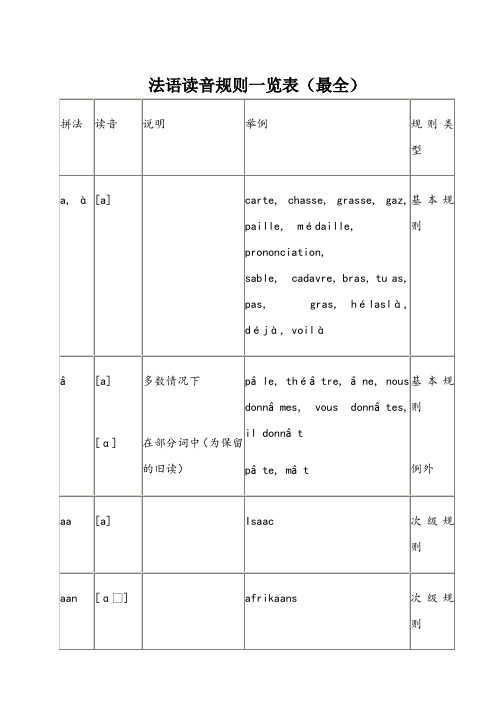
elle, perte, laine, fée, partie, aiguë
Jean, asseoir, remerciement
samedi
基本规则
基本规则
例外
次级规则
例外
基本规则
例外
基本规则
次级规则
次级规则
例外
例外
例外
基本规则
基本规则
基本规则
次级规则
后接元音字母,但在词首
在i后(但不在-enc-,
-ens-, -ent-结构中)
在y后
在é后
在某些拉丁语词和外
语借词中
在某些专有名词中
在少数拉丁语词末
entre, sens
enougueillir, enivrer
bien, rien, parisien
citoyen, moyen
européen, méditerranéen
[e]
在重读音节中
在个别词非重读音节中
在非重读音节中
neige, seize
treizième, seizième
neiger
基本规则
例外
基本规则
ein
[ɛ̃]
后无元音字母或另一个n
plein, éteindre
次级规则
em
[ɑ̃]
[ɛm]
后无元音字母或另一个m或n
在个别词中
temps, novembre
aspect, respect
基本规则
例外
d
[d]
无音
在词首和词中
在少数词末
在词末
deux, maladie, cadre
法语读音规则完整版
法语音素读音规则第一节元音1. [a]舌平放于口中,舌尖轻抵下齿龈,开口度较大。
与汉语拼音中的a相似,但肌肉更紧张。
与英语的[a:]相比,发音点在舌前部。
1)字母a, à,âbanane, là,fâché*2)字母e在mm或nn前(少数词)femme,solennel2. [ε]舌尖抵下齿龈,舌面微微向上颚隆起,开口度比[a]要小,与英语的[e]相似。
1)字母è,ê,ëmère, fête,noël2)字母组合ai,aî,ei lait,maître, reine3) 字母e在闭音节中mer,service, respect4)字母e在两个相同的辅音字母前(m,n除外)belle,cette,adresse5) 字母组合—et在词末poulet,filet3. [e]舌尖抵下齿,舌前部稍向硬腭抬起,开口度比[ε]略小,唇成扁平状。
注意与英语的[ei]音相区别,保持发音部位紧张,口形不要滑动。
1)字母éété, léger2) 字母组合-er, -ez, —ed loger,visiter,parler, chez, pied3) 字母组合es在单音节词中les, des, ces*4)字母组合ess-, eff-, desc—, dess—在词首essai, effet, descendre,dessert4。
[i]舌尖紧抵下齿龈,舌前部向硬腭抬起,上下齿靠近,开口度很小,双唇向两边拉,唇形扁平,发音时肌肉紧张。
字母i,î, ï及y petit, finir,île, maïs,bicyclette5. [y]舌位、开口度和肌肉紧张程度与元音[i]相近,但属中元音,发音时双唇突出,绷紧呈圆形.于汉语拼音中的ü类似,但唇部肌肉更紧张。
(完整)法语发音规则汇总版,推荐文档
êt 在词末 ect 在词末 特殊
Forêt Respect nécessaire e[e]
successeur[syksesœ :r] processus[prɔsesys]
[e] é 闭音符 注意:区别 ê è er ez 在词尾 注意 : er 在单音节词中 发[εr]
été répétez étudiant vélo désolé léger tenez regarder parler dîner v. mer fer cher
im
timbre / impossible simple
ym
symbole sympathique
ain
main / américain pain crainte
aim
faim
ein
plein / peinture teint
attention : in im ain aim ein 后面无元音字母或 m, n
区分: g 在 e, i, y 前发[ʒ]
gêne logis gymnastique
[f] f
Foule flame
ph
Photo physique
f 在多数词的词末
Vif chef sauf
[v] v
vie vide voir
w
[∫] Ch Sh (外来词) Sch
[ʒ] J G在e i y 前
[g] g 在 a, o, u 及辅音字母前 gare(火车站 f.) gomme(橡皮 f.) /
garçon gorge(喉咙 f.)légume(蔬菜
m.) augmenter
gu 在 e,i 前
guerre[gεr] guide
法语最全音标发音表格整理汇总打印版
D
d念[d](浊辅音)
E
e+mm/nn念[a]
è,ê,ë念[ɛ]
e在闭音节中念[ɛ]
é念[e]
辅+e+辅+元e念[ə]
辅+e+辅+辅e念[ɛ]
ei→[ɛ]
-et→[ɛ]
es在单音节词中→[e]em,en→[ã]
en在少数词中→[ɛ̃̃]
eau→[o]
eu,oeu在词末开音节→[ø]eu+z/t/d/tr→[ø]
eu,œu除以上情况→[œ]
F
f念[f]
G
g+e/i/y念[ʒ]
g不在e/i/y前念[g]
gn→[ɲ]
gu+e/i/y→[g]HhFra bibliotek远不发音I
i,î,ï念[i]
i,ï+元音念[j]
im,in,ym,yn,aim,ain,ein→[ɛ̃]
-ien,-yen→[j]
-il在元音后→[j]
ill在元音后→[j]
x+辅音念[ks]
x在序数词中念[z]
x在少数词中念[s]
Y
-y-前后都是元音时念[ij](y=i+i)(在少数词中不适用)
-y-前后都是辅音字母时念[i]
y在元音前或在词首念[j]
Z
z念[z]
提炼:
1)au →[o].
只在r前变[ᴐ]
2)o →[ᴐ].
只在①z音前②词末开音节③ô时变[o]
3)eu →[œ].
A
红色是用来标记字母表中的元音字母
a, à,â念[a]黑色释义是在单词中的该字母的发音规则
ai,aî→[ɛ]
法语发音规则汇总版
[] 1 deux nœud / veux queuecourageux feu bleu jeux heureuxbœufs[b] vœu2 vendeuse / creuser précieuse (a.)heureusejeudi / neutre中立的Europe (f.)émeute骚乱其他情况eu œu一般发[][][]les yeux[j] / yaourt [jaurt](m.)Cherche cacher Shampoing [∫pw] Schéma[r]r Revue surrue verre[]gn ligne / enseigner campagne montagne应该注意的问题:1 X 有时发[ks] texte (m.)Attention : Six dix deuxième sixième seaux couteauxex 在词首:ex+辅音 [ks] excuse excellent expliquer expertex+元音 [gz] exercice(m.) exemple(m.) exactement 2. ien [j] lien bien sien tiens[tj]4. oin [w] loin soin point3.tion 后面无元音字母或n, m, 前面没有s[sj] solution révolution nationstion发[stj] question [k stj]attention : national [nasj nal] questionnaire (m.) [k stj n:r]鼻化元音[]Un brun(褐色的)Um parfum(香水m.) / humbleà jeun 空腹 [aʒ]eun个别词中[]an ancien / dans chance Franceam lampe / chambre jambe camp campagneen entrer / vent lentement dent(f.)em membre / temps ensembleattention : an, am, en, em 后无元音字母和m, nex : année ami amuser énergie ému ennemi [εnmi][][]attention : in im ain aim ein 后面无元音字母或 m, nimage américaine aimer innovantien [j] lien bien sienoin [w] loin soin point。
- 1、下载文档前请自行甄别文档内容的完整性,平台不提供额外的编辑、内容补充、找答案等附加服务。
- 2、"仅部分预览"的文档,不可在线预览部分如存在完整性等问题,可反馈申请退款(可完整预览的文档不适用该条件!)。
- 3、如文档侵犯您的权益,请联系客服反馈,我们会尽快为您处理(人工客服工作时间:9:00-18:30)。
radoub
基本规则
例外
例外
次级规则
基本规则
bb
[b]
abbé
基本规则
c
[k]
[s]
[g]
无音
在a, o, u或辅音前
在œu前
在词末
在e,æ, i,œ, y前
在个别词中
在部分词词末
carte, comme, culture
Metternich, Machiavel
varech
sandwich, macho
almanach
基本规则
次级规则
例外
例外
例外
例外
ck
[k]
yack, bifteck, gecko
次级规则
cqu
[k]
acquis
次级规则
-ct
[kt]
无音
多数情况下
在少数词末
direct, correct, exact
基本规则
â
[a]
[ɑ]
多数情况下
在部分词中(为保留的旧读)
pâle, théâtre,âne, nous donnâmes, vous donnâtes, il donnât
pâte, mât
基本规则
例外
aa
[a]
Isaac
次级规则
aan
[ɑ̃]
afrikaans
次级规则
æ, ae
[e]
cæcum, nævus, curriculum vitae
次级规则
ai
[ɛ]
[e]
[ə]
在重读音节中
在“ai+辅+无音e+辅+
元”中
在-airie中
在其他少数词中
在非重读音节中
作为动词词尾
在其他少数词中
在少数词中
vrai, aigre, japonais, je baisse,
fraise, française
laiterie
prairie, libraire
之前时)
在一些外国专有名词
中
在其他个别词中
在其他某些借词中
在个别词末
Chine, chair, poche
chaos, chœur,écho, orchestre,
psychologie, archaïque, orchidée,
chrétien, technique, chlore
Miche-Ange, Munich, Moloch,
vraiment, aiglon, aigrelet
aigu, aimer, baisser, saison
ai, eurai, serai
gai, quai
nous faisons, je faisais, faisant,
faisable, faiseur, satisfaisant,
faisan
pays, paysage, paysan, abbaye
基本规则
基本规则
次级规则
例外
例外
b
[b]
[p]
无音
在词首和词中
在少数词sub-在s, t前
在词末
blanc
baobab, club, tub, snob, nabab
subsister, subside
在少数词(特别是专
有名词)词中
在个别词中
tramway, Fontenay
crayon, payer
je paye, je payerai
fayot, tayaut, brayette, bayer,
bayadère, mayonnaise, papaye, papayer, Ayen, Bayard, Bayonne,Cayenne, Himalaya, La Fayette, Mayence
cœur
sac, caduc, avec, lac, bec, Marc
ce, cæsium, civil, cœlacanthe,
bicyclette
second, seconder, zinc
tabac, estomac, blanc, franc, tronc,
banc, jonc, ajonc, porc, croc
am
[ɑ̃]
[am]
后无元音字母或另一
个m或n
在个别借词中
camp, chambre
tramway, wolfram, hamster
基本规则
例外
an
[ɑ̃]
后无元音字母或另一个n
chanter, ancien
基本规则
aon
[ɑ̃]
paon, faon
次级规则
aoû
[u]
août
次级规则
au
[o]
[ɔ]
法语读音规则一览表(最全)
拼法
读音
说明
举例
规则类型
a,à
[a]
carte, chasse, grasse, gaz, paille, médaille, prononciation, sable, cadavre, bras, tu as, pas, gras, hélaslà, déjà, voilà
基本规则
例外
基本规则
基本规则
例外
例外
ç
[s]
在a, o, u前
ça, leçon, reçu
基本规则
cc
[k]
[ks]
在a, o, u和辅音字母前
在e, i前
accord
accent, accident
基本规则
基本规则
ch
[ʃ]
[k]
[tʃ]
无音
多数情况下
在某些希腊语词根中
(特别是ch在l, n, r
aspect, respect
基本规则
例外
d
[d]
无音
在词首和词中
在少数词末
在词末
deux, maladie, cadre
sud, lied, djihad, Alfred, David, Madrid, le Cid
pied, accord, prend
基本规则
例外
基本规则
dd
[d]
addition
基本规则
e,ë
[ɛ]
[e]
[ə]
无音
在闭音节中
在末音节相同两辅音字母前
在某些词词中相同两
辅音字母前
在末音节-il-前
在个别词词中-il-前
在词末-et, -ect中
在其他个别词中
在词中相同两辅音字
母前
在词中sc, ck前
在词中-il-前
在某些拉丁文词中
基本规则
次级规则
次级规则
例外
基本规则
次级规则
例外
例外
aî
[ɛ]
[e]
在重读音节中
在少数词的非重读音节中
在非重读音节中
maître, connaître
fraîcheur
aîné, chaînon
次级规则
例外
次级规则
aim, ain
[ɛ̃]
后无元音字母或另一
个m或n
faim
main, pain
基本规则
多数情况下
在少数词[r]前
在[r]前
在少数词中
saule, chaud, gauche
auréole
aurore, saure, j’aurai, je saurai
Paul, mauvais, augmenter
基本规则
例外
次级规则
例外
ay
[ɛ]
[ej]
[ɛj]
[aj]
[ei]
在词末
在词中元音前
在后跟无音e时
